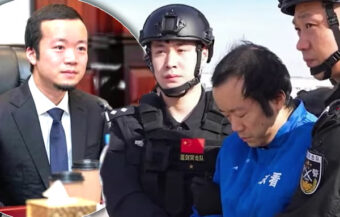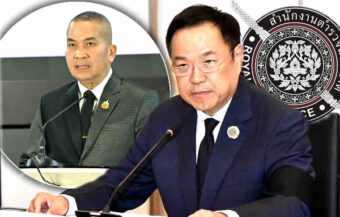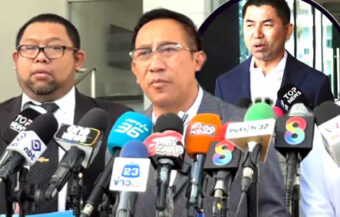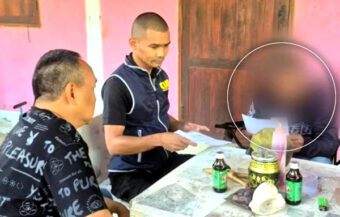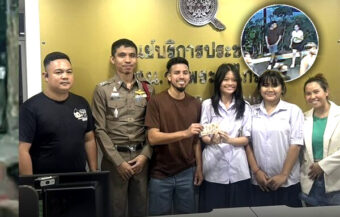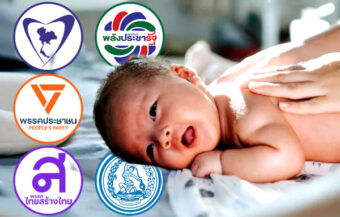Martial law declared as Thai troops seize control of key Cambodian border zones after deadly May 28 clash. Crossings shut, tourists discouraged and military crackdown targets smugglers, gamblers and traffickers. Tensions soar as talks near and civilian authority sidelined.
On Saturday, Thailand’s military units mobilized along the Cambodian frontier as they moved to secure control of the kingdom’s border. While major crossings remained open, several minor checkpoints were shut down. Meanwhile, martial law was declared in key areas, placing access to Cambodia under military supervision. The move aims to bolster security and maintain order amid a tense military buildup by Cambodian forces on the opposite side of the border.
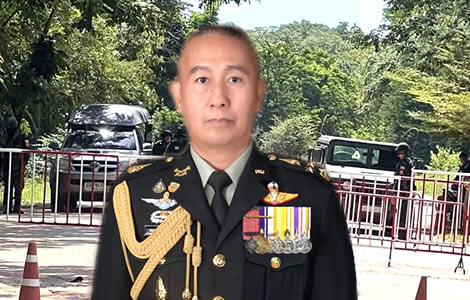
The Thai military has taken over direct control over key border zones with Cambodia following a fresh spike in tensions. On Saturday, martial law was declared in some areas across several eastern provinces near border crossings. The move came just 24 hours after a top-level military summit in Bangkok.
It heard reports of a buildup of Cambodian troops and military hardware, particularly around the Chong Bok area. Afterwards, military officials revealed that the kingdom is dealing with an aggressive move by Cambodia to encroach on Thailand’s territory.
General Pana Klaewplodthuk, Commander-in-Chief of the Royal Thai Army, signed the required order on Saturday morning. This came following intense consultation with the government.
Thai military assumes direct control of border zones after tensions escalate with Cambodian forces near Chong Bok
Troops were quickly deployed to Chanthaburi, Trat and Sa Kaeo provinces. Commanders cited “emergency defence measures” and the need to safeguard Thai sovereignty. Although government ministers earlier preached cooperation, the military has now taken charge.
Deputy Prime Minister Phumtham Wechayachai met Cambodian leaders in Phnom Penh last Thursday. He assured reporters of peaceful dialogue and bilateral ties. But by Saturday, his tone had shifted sharply. He issued a four-point declaration urging national unity, border security and territorial protection.
The trigger was a May 28 Cambodian military incursion near Chong Bok, a contested area in Ubon Ratchathani’s Nam Yuen District. Cambodian troops reportedly advanced 200 meters into Thai territory. When asked to pull back, they refused. Gunfire ensued in which a Cambodian soldier was killed.
The Royal Thai Army responded to its new powers on Saturday. Border security was tightened. Military checkpoints began screening all travellers more closely. Some crossings were closed entirely without warning.
Major General Winthai Suvari, army spokesman, outlined a four-stage plan for border control. Each step increases pressure and restrictions depending on security risks.
Four-stage border control plan restricts travel and closes some crossings to ensure Thai security amid tensions
Firstly, only essential travellers may pass. That includes truck drivers, labourers and local residents with proper documentation. Suspected gamblers and criminal suspects face denial.
Secondly, border hours are being shortened. Access is now scheduled and staggered. This measure aims to reduce crowding and detect threats early.
Thirdly, some crossings will close entirely. Soldiers will target “high-risk” entry points, including known smuggling corridors and illegal gambling routes.
Fourthly, in case of violent conflict, all crossings could be sealed. Army officers now have full authority to act without waiting for civilian approval.
Some of these steps were seen unfolding on Saturday. Several minor posts in Sa Kaeo were shut. In Chanthaburi, crossings at Ban Laem and Ban Pakkat were restricted.
Tourist access was stopped without notice. Many travellers were caught off guard. Most were left on their way but advised against it. However, trade trucks and labourers were allowed through under strict control. Business people and traders are also allowed access for now.
Tourist access halted without warning as strict controls applied to trade and labour across key border points
Authorities reassured the public that full closures are not yet in place. Captain Noppornroj Siripariyapong from the Chanthaburi Task Force issued a calm statement. “No blanket order has been issued,” he said. “Tourists are discouraged, but freight and emergencies may still pass.”
Officials warned travellers to coordinate with checkpoints before crossing. Anyone venturing into Cambodia now risks being stranded or worse. Tourists often cross for visa runs, casino visits or shopping. But now, the army is cracking down. Gambling and scam operations have become a top concern.
The crackdown is particularly targeting Cambodian-based call centres and casinos. Many employ Thai nationals illegally. Some of these workers fall victim to trafficking or forced labour.
Military commanders stressed that security comes first. Still, they promised that humanitarian cases would be handled with care.
“We will not block students or the sick,” said an officer from the Burapha Task Force. “But we urge caution.”
Military crackdown targets illegal gambling and trafficking as border security tightens amid tensions
The First and Second Army Regions now have command over local implementation. Units have been ordered to use judgment and act fast if needed. Troops from the Suranaree and Burapha Forces are patrolling key crossings. Surveillance drones were spotted flying low over forested paths.
Cambodia’s government has not backed down. Prime Minister Hun Manet accuses Thailand of military threats and plans to resist. He insists that the disputed land lies within Cambodian borders. Cambodian troops remain stationed there, despite Thai protests.
Talks have been scheduled for June 14 under the Joint Border Commission. However, both sides expect little progress. Previous JBC meetings have ended without agreement. Thai negotiators want withdrawal before talks. Cambodia wants talks without conditions.
Meanwhile, the Thai military appears to be preparing for the worst.
Although no major violence has erupted, the standoff remains tense. Soldiers are on high alert along jungle trails and river crossings.
In Sa Kaeo, minor checkpoints were sealed abruptly. Visa runners—especially from Laos, Malaysia, and Singapore—were turned back. At Tha Mapok, Thai soldiers blocked the Bueng Trakwan crossing. Cambodians working in Thailand were seen returning in groups.
Cambodia refuses to withdraw troops as border talks approach; Thai military prepares amid tense standoff
Truck drivers hauling produce were allowed through, but only after full inspections. Documents were checked. Cabins were searched. One trader from Aranyaprathet said delays are already causing fruit spoilage. “We wait hours now,” he said. “My mangoes are rotting.”
The Royal Thai Army maintains that trade will not stop—unless provoked. “We want peace, but we must be ready,” said Major General Winthai.
Back in Bangkok, the civilian government appeared flat-footed. Prime Minister Paetongtarn Shinawatra has been sidelined. Her ministers appear to be reacting to events. Of course, in this matter, they must allow the military to have sway.
Deputy Prime Minister Phumtham’s sudden shift in tone may reflect rising military influence. Until Saturday, the Ministry of Defence and Security czar promoted diplomacy. Now he warns of conflict. The Thai military is certainly in control of this situation. Civilian voices have been drowned out by the men in camouflage.
Analysts say Thailand hopes to deter without shooting. But undoubtedly a high level of risk remains. A misfire, a misunderstood order—any could start a firefight. So far, martial law allows soldiers to detain suspects without court warrants. Civilian authorities in key border areas are presently subject to military command. Army units are checking ID cards and licenses.
Thai army asserts control as civilian government remains silent amid escalating border crisis with Cambodia
Local police have been told to assist. Soldiers and officers now work together at key crossings and bus terminals. Residents have been advised to prepare. Emergency kits and extra food have been suggested. Rumours of a wider conflict are spreading fast.
However, army officials insist the media must avoid panic. “No fake news, no fear-mongering,” warned the Defense Ministry on Saturday. Meanwhile, the Ministry of the Interior is preparing plans in the event of conflict. This includes shelter and support for impacted civilians living within 20 km of any strife-prone border points.
Thai Cambodian border tensions worsen as matters threaten to spill over into the kingdom’s politics
Dangerous impasse between Thailand and Cambodia as PM rules out International Court of Justice (ICJ)
Hun Manet confirms Cambodia ultimately may decide to send border dispute with Thailand to the Hague
Rome calls for a wider and more decisive response to Cambodia’s antics on the border after the latest clash
Khmer soldier killed in deadly gunfire between Thai and Cambodian armies near Ubon Ratchathani
Journalists were therefore urged to double-check facts. Several online posts were blamed for confusion over border closures. Nevertheless, the atmosphere remains volatile. With thousands of troops now deployed, even a small incident could spark escalation.
The coming days will be crucial. If Cambodia refuses to pull back, Thailand may move forward—possibly with force. For now, the military holds the line. But the clock is ticking. The border is tense. And meaningful dialogue may not come in time.
Join the Thai News forum, follow Thai Examiner on Facebook here
Receive all our stories as they come out on Telegram here
Follow Thai Examiner here
Further reading:
Dangerous impasse between Thailand and Cambodia as PM rules out International Court of Justice (ICJ)
Hun Manet confirms Cambodia ultimately may decide to send border dispute with Thailand to the Hague
Khmer soldier killed in deadly gunfire between Thai and Cambodian armies near Ubon Ratchathani
Thaksin to address state board on drug suppression despite howls of protest from human rights groups
Health Minister Somsak launches regulatory blitz to outlaw non-medical cannabis use within 40 days












